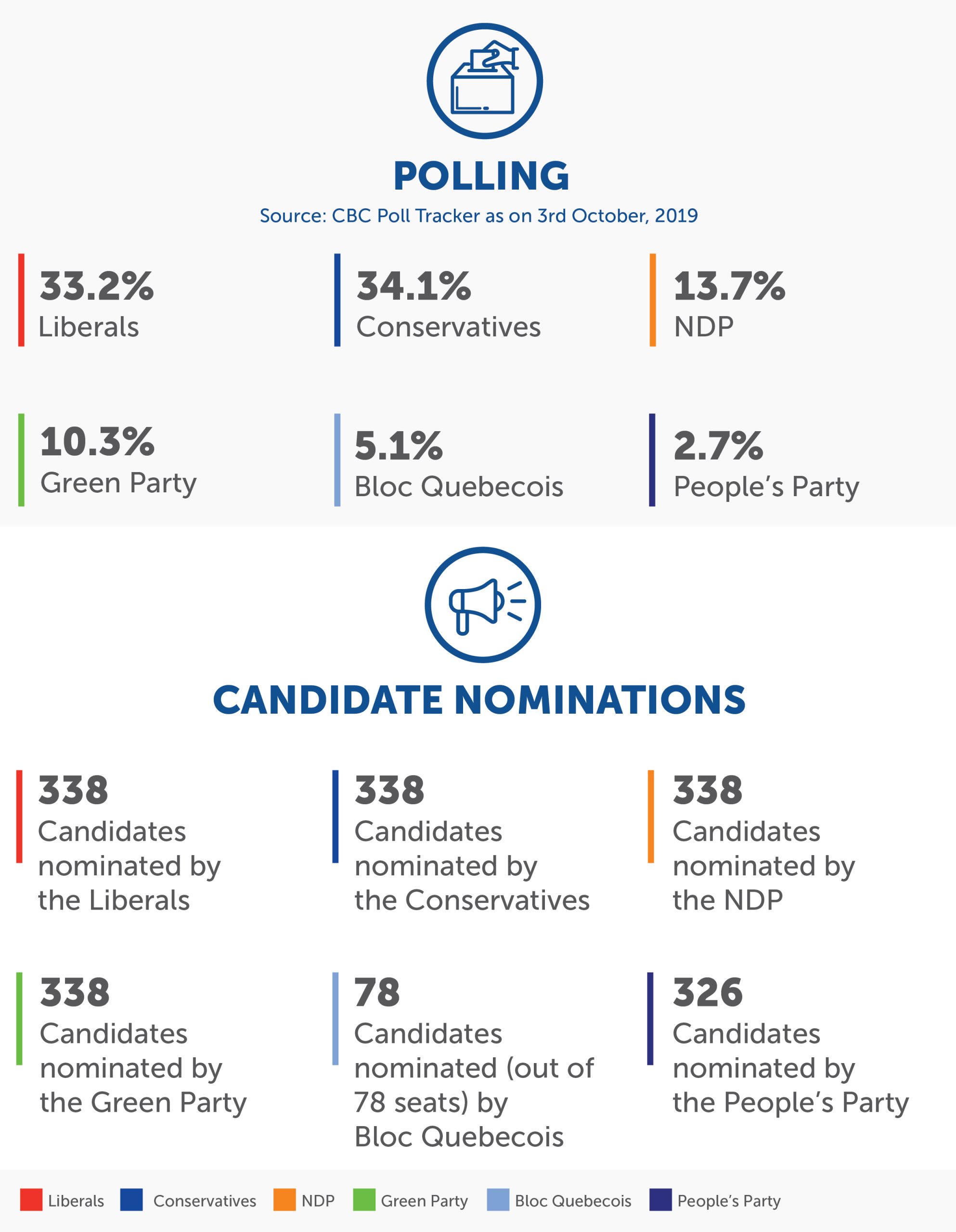Federal Election Update: Week 3: Another Week Down in the Seinfeld Campaign

The third week of the 43rd federal election may prove to be when Canadians finally started tuning in. Coming off a surprising brownface/blackface scandal, the election returned to its prior course of hastily constructed policy proposals and digs at past leaders.
The Liberals released their election platform in a context where they continue to trail the Conservatives by a small margin nationally in voter preference while maintaining a lead in projected seat count.
The Conservatives continued to announce individual promises such as new infrastructure spending and a national energy corridor.
The New Democrats have struggled to gain traction despite big commitments on childcare and dental care, while the Green Party has had to defend its platform costing against failing grades from fiscal observers.
Go deeper: See the StrategyCorp Federal Poll Tracker for our aggregation of decided voter polls
Against that backdrop, the date to officially register candidates has passed, meaning it is too late to remove a candidate from a ballot. Normally, parties wait until after this deadline to launch some of their best research attacks because leaders will have no choice but to stick by any controversial candidates. Given that this election has already seen its fair share of mudslinging, expect more of the same over the next week.
Looking ahead, the second debate of the campaign happened on October 2 with a French debate hosted by TVA. The debate featured the Liberals, Conservatives, Bloc Quebecois, and New Democrats.
The consortium debates, which will include the People’s Party of Canada and the Green Party, begin on October 7 with the English debate, followed on October 10 with the French debate.
This last stage of the campaign offers an opportunity for the trailing parties to gain ground. The election race is finally starting to heat up, just in time for Canadians to head to the Thanksgiving table armed with their thoughts on recent events.

Liberals
The Liberals released their platform on Sunday. The document key themes are like those of 2015 – economic growth and ensuring that all Canadians can see themselves benefitting from that opportunity. As a political tool, it sets the Liberals up to attack the Conservatives on wedge issues such as gun control. The plan to continue deficit spending indefinitely appears to have been classified as a non-issue for potential Liberal voters.
The Global Climate Strike on Friday was revealing. Trudeau met with climate activist Greta Thunberg in advance of joining the march in Montreal and pledged the Liberals will plant two billion trees if elected. Thunberg told reporters later she gave Trudeau the same message she gives all leaders she meets: You aren’t doing enough.
Despite the meeting and announcement, Liberal support among younger Canadians dropped following the marches, with the Greens and NDP gaining. Climate change may be an issue that the Liberals avoid as it drives their more progressive voters further left.
Overall, the posture of the Liberals has been stronger this week. Heading into the consortium debates, Trudeau is expected to be the focus of attack from other party leaders, although this was not on display during the TVA debate last night. Increasingly, this election is a two-party race between the Liberals and the Conservatives.

Conservatives
In election campaigns, strategists often talk about “sword versus shield” issues, where parties either attack or defend on policy.
Last Friday’s climate marches in cities across Canada required Andrew Scheer and the Conservatives to raise a strong shield in the face of heavy media coverage. While Scheer and the Tories rolled out an environmental platform in June, they’re unlikely to be the darlings of the environmental movement or marchers in the street.
There was little upside for Scheer to participate in marches where even Prime Minister Trudeau was branded by some activists as failing on environmental policy. By announcing policy in Vancouver on transit and infrastructure improvements, Scheer largely managed to stay out of the wider debate on the issue. However, the climate change and Conservative policy in relation to it continues to follow the Conservative campaign.
In addition, the launch of the Liberal platform on Sunday provides the Conservatives with evidence for their narratives around skyrocketing spending versus a Tory plan that focuses on affordability. The real question for both parties is whether massive deficit spending drives voters to the red or blue camp.
While the Conservatives will want to stay on-track with their affordability message, the Globe and Mail’s revelation that Scheer holds a dual citizenship with the US may derail the Conservative message calendar over the next few days. It remains unknown how voters will react to this news and how the opposition parties will seize this opportunity to paint Scheer in the same negative light that former prime minister Stephen Harper painted Stéphane Dion and Thomas Mulcair when it was announced that they were also dual citizens. This issue is further exasperated by Scheer’s critique of former governor-general Michaëlle Jean in 2005 when he raised concerns with her holding a dual citizenship with France.

New Democrats
NDP leader Jagmeet Singh wrapped up eight days of campaigning in British Columbia, a tour that included a high-profile endorsement, the announcement of key planks of his platform, and the release of a full slate of nominated candidates.
Relative to the other major parties, the NDP was slow to nominate and register candidates ahead of this week’s deadline. The delay means uncertainty at the local level, as voters in many ridings now have significantly less time to acquaint themselves with the New Democrat on their ballot.
A disadvantage in operational readiness is also apparent in fundraising numbers, which has led the NDP to rely on social media messaging and short paid advertisements to contrast its progressive credentials with PM Trudeau and the Liberals.
While other party leaders spent time in battlegrounds in Central Canada this week, Singh’s emphasis on the West Coast reveals how the NDP likely views the region: an important beachhead where the Party may be able to break through, and/or a vulnerable area where existing seats need protection.
Singh is likely to continue to brandish core policy announcements, such as the creation of 500,000 new child-care spaces, to prove his comparative seriousness on progressive issues from gender equality to economic justice.

Greens
On the heels of the world’s largest ever climate demonstrations, the Green Party nevertheless faces an uphill battle to claim ownership of the public’s increasing environmental concern. The Liberals, NDP, and Bloc have doubled down on their commitments to fight climate change, and in a low interest election, the Greens have struggled to command significant media attention on what should be their core issue.
After campaigning across Nova Scotia this week, Leader Elizabeth May reiterated the urgency of acting to address the climate crisis, noting that the Liberal plan offered too little, too late.
May also continued to spar with NDP leader Jagmeet Singh over her commitment to social justice issues and launched new criticisms of Andrew Scheer’s career trajectory. The Green plan was also sharply criticized for its costing; revised figures are to be released soon.

Bloc Québécois
As federal leaders prepared for the TVA debate, BQ Leader Yves-François Blanchet continued to make his case to Quebecers that only his party truly understands the values of and challenges facing the province. This message is particularly resonating in many NDP-held seats and could lead to a breakthrough for the Bloc, potentially catapulting them into a position of holding the balance of power in a minority government.
During the TVA debate, Blanchet emerged as a calm and collected leader. Blanchet’s strong command of the issues and ability to easily convey his ideas in French positioned him as a credible and effective voice for Quebecers. His performance during the TVA debate is sure to give him increased profile during the final weeks of the campaign and increase his exposure with voters who are still not familiar with him.
The question remains whether he can capitalize on his strong performance by turning it into votes in battleground ridings across the regions.

People’s Party
For Maxime Bernier and the People’s Party, they’ve already had their biggest win in the campaign with permission from the new Debates Commission to take part in the English and French Leader’s Debates.
Although the party argued differently to gain entrance into the consortium debates, it appears that Bernier’s home riding of Beauce is the only real battleground for the PPC. Polling shows him in a tight two-way race with the Conservative candidate.
The Beauce has often gone its own way in past elections, including electing Bernier’s father Gilles as an independent in 1993. Only Election Day, will see if Bernier can squeak back into the House.

